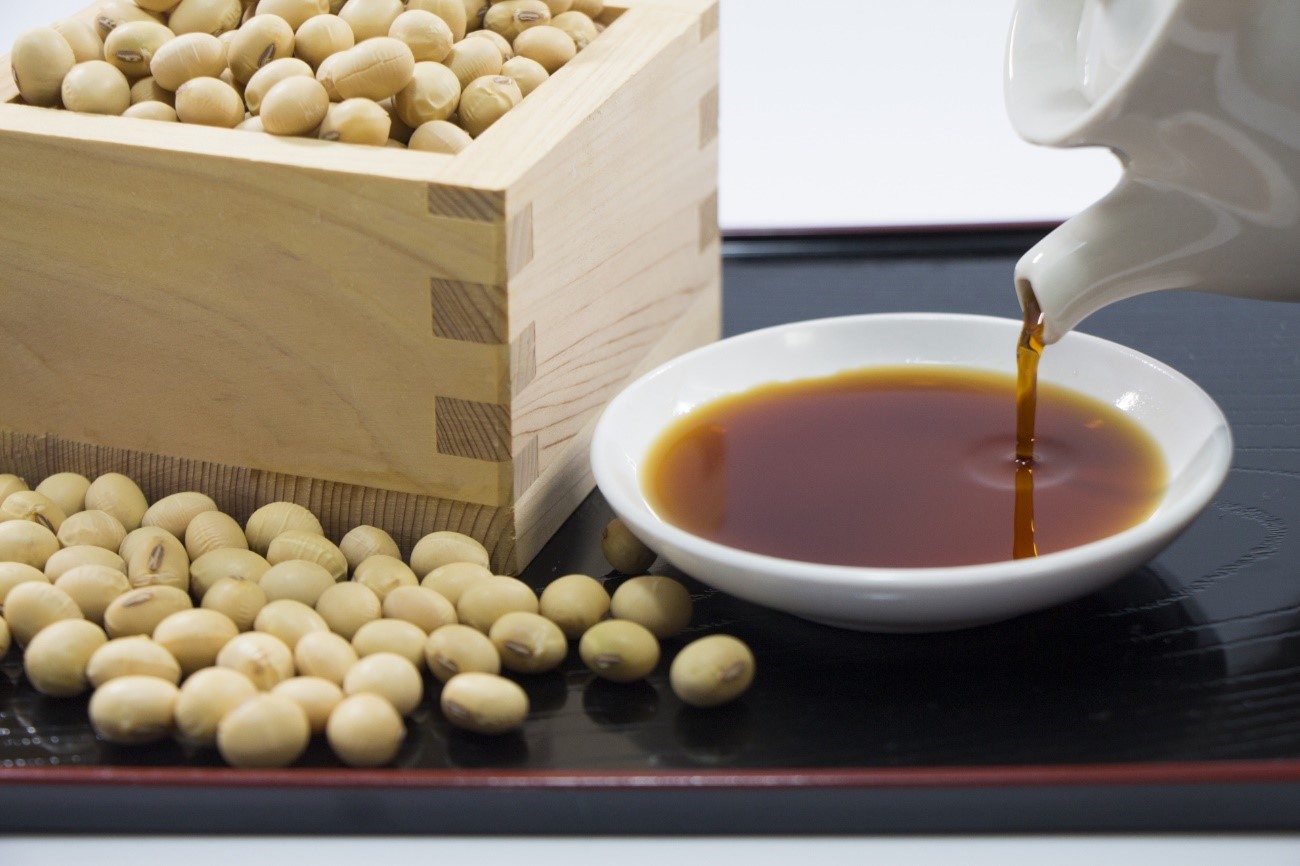Japanese original liquid seasonings
Japanese cuisine is so unique, and it is the thing that all tourists are looking forward to doing when traveling to Japan. As Muslims, at the same time, there is a concern about what is included in our meal because food culture is so different.
We have seasonings which is made from or have residual alcohol, but also some of the original seasonings served as an accompaniment for your meal. Today, we are going to introduce liquid accompaniments to you and how it should be used, to let you enjoy your gourmet experience in Japan!

Japanese original liquid seasonings that accompany your meal.
The most basic Japanese liquid accompaniments are as follows:
Soy sauce (醤油)
The most basic and fundamental seasoning in Japan. It is used in cooking as well as an accompaniment, especially for Sashimi or Sushi. It was first invented back in 11th century, but the original soy sauce is believed to have been invented many more years back. Soy sauce is made from soybeans, wheat, salt and malted rice, which is made after fermentation. As this is the most basic sauce, soy sauce is used almost every day in Japanese culture, though there are some varieties.
Japanese people change their soy sauce depend on what they eat. Usually, they choose sweet and thick soy sauce when eating Sashimi or Sushi, or when they cook or simmer food, they would choose strong and salty soy sauce. In Tokyo, they tend to consume thick and strong soy sauce while the lighter one is more used in Kansai region. In Kyushu however, they use sweetened soy sauce on a daily basis. It could be very fun for you to find your favorite soy sauce while traveling in Japan.
The easiest way to get your halal soy sauce, check this page.

Dashi broth (出汁)
This is more like a soup to cook food, rather than an accompaniment.
Dashi is a Japanese version of broth, made from either Kombu seaweed or fish like bonito or sardines. Dashi itself has no taste in it, but it is the number one priority to make a perfect food, because this broth is full of glutamine, known as Umami. Dashi is always used for Soba and Udon noodle, simmered dish or whatever the food that comes with soup.
Unlike Western culture, fortunately, we never make Japanese Dashi from meat, so as a Muslim there is nothing much to worry about. However, please be reminded, that some of the ready Dashi broth stock may contain preserves which is made from alcohol products, or they may have added ingredients from meat. It will be always safer to cook Dashi from seaweed or dried fish.

Ponzu Vinegar (ポン酢)
This is a type of vinegar that you can find only in Japan. Although Ponzu is used just like vinegar, their flavor is different. Juice from Japanese original citrus fruits like Daidai, Yuzu or Kabosu are added into vinegar with a bit of soy sauce. This fresh and aromatic vinegar is a perfect accompany for grilled fish or greasy meat. Together with Gomadare sesame sauce, it is the must have sauce for hot pot.
The recipe could vary in most of the cases, but Ponzu itself can be Muslim-friendly, unless soy sauce with alcohol or Mirin is used.

Sauce (ソース)
Sauce does not sound very specific, but we call thick and brown liquid as “sauce”. It is used for various dishes and each one has slight difference. We use Okonomiyaki sauce for Okonomiyaki / Takoyaki, or Ustah sauce (ウスターソース) for fried dish. The name came from Worcestershire sauce from U.K.
Although the sauce tastes different from original Worcestershire sauce, the recipe and ingredients are still very similar. It is made from stewed vegetables and fruits, sugar, salt, spice and vinegar. Original sauce sounds like Halal, however, we have some sauce which has pig/animal essence and/or alcohol added to make a thicker flavor, so try to choose Halal certified one in Japan.

Gomadare sesame sauce (ごまだれ)
Together with Ponzu vinegar, this is what we must have for our hot pot! It is a thick and sweet sesame sauce, which we can also see in Chinese food. It is made from ground white sesame, sugar, Dashi broth, soy sauce and Mirin. As Mirin is alcohol, the sauce is unfortunately not Halal.

Rayu spicy oil (ラー油)
This oil also came from Chinese food, but it is part of our daily seasoning. It usually has red color, with some condiments at the bottom. This is because Rayu is made by frying red chilli, Chinese pepper, leek, ginger and garlic in oil. Red chilli makes the oil into red. Rayu is often consumed for Chinese food or Ramen, because it has a very crispy flavor, and it does not go well with Japanese meal.
The oil is generally Halal, as there is no alcoholic or animal products added. In recent Japan, we have our original Rayu called “Rayu to eat (食べるラー油)”, which has bigger garlic and chilli condiments. Some of them are halal certified, so trying them is one thing you can enjoy without being worried.
To find out Halal certified Rayu to eat, check this page.

Tartar sauce (タルタルソース)
This sauce also came from U.K., but the recipe is quite different. It is a sauce made from mayonnaise, mixed with chopped onion and boiled egg, cucumber pickles, vinegar, pepper and some herbs. The sauce is thick and heavy but is also fresh and sour, so it is used for fried fish and oysters in Japan. Miyazaki’s specialty, Chicken Nanban, also uses this sauce.
As seafood fried dish is one of our recommendations for Muslim travelers, we would like to say this sauce is Halal. However, as vinegar and mayonnaise could have small portion of residual alcohol, it is safer to bring your own Halal mayonnaise if you want to make sure that your meal is 100% halal.

BBQ Sauce (焼き肉のたれ)
BBQ is our favorite dish, and what makes it taste even better is this sauce! Though we have so many varieties, generally, BBQ sauce is thick and sweet, but very appetizing as it contains garlic, onion, or whatever makes meat taste better.
As recipe could vary a lot, we cannot precisely mention their ingredients. However, in most of the cases, they would contain alcohol and animal product, so it should be avoided.

Enjoy your Japanese gourmet more confidently!
You may see a lot of unique seasonings in Japanese meals, but it is one of the things you have to try when visiting Japan. Now with some information about Japanese accompaniments, we are sure that you can enjoy your dining experience better.
Still, it is quite difficult to ensure that they are Halal. If you would like to make sure that you only take Halal food in Japan, feel free to ask us for help! We are happy to deliver Halal Japanese meals to wherever the location you wish.

